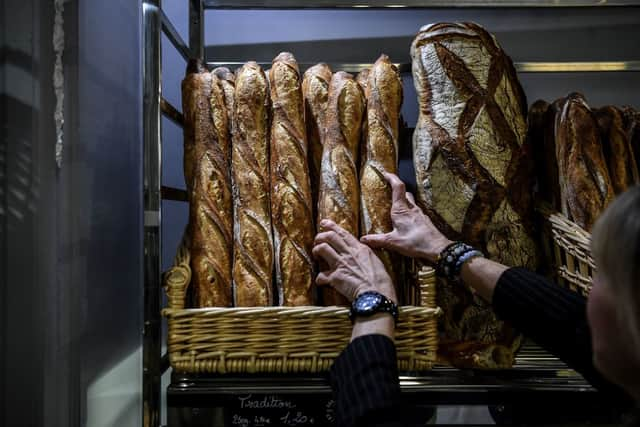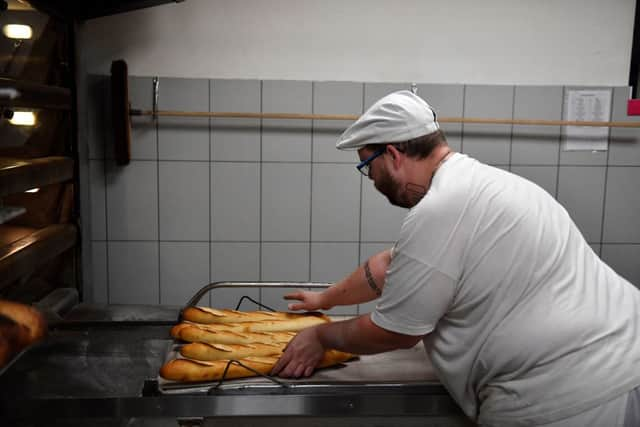UNESCO cultural heritage list: why French baguette bread was added - what else made 2022 list?
and live on Freeview channel 276
The United Nations Educational, Scientific and Cultural Organisation (UNESCO) has announced the latest additions to its heritage list.
Every year, countries around the world apply to have their culture and traditions preserved for posterity. By doing so, they increase their chances of receiving international help to keep the particular cultural phenomenon alive.
Advertisement
Hide AdAdvertisement
Hide AdIn recent years, it has meant things like the Indonesian instrument Angklung has been able to raise its profile. The UK currently has none of its heritage listed, but European neighbours - including France and Spain - now have several entries.
One of the most recent for France has been the art of Baguette making, which made it onto the 2022 list.
So, why do France and the UN think the Baguette needs protection - and what else made the 2022 cultural heritage list? Here’s what you need to know.


What is the UNESCO Intangible Cultural Heritage Convention?
The UN says the Convention “promotes the safeguarding of knowledge and skills” required for “traditional craftsmanship and cultural practices” that are passed down through generations of families and communities.
Advertisement
Hide AdAdvertisement
Hide AdThese can be oral traditions, performing arts, social practices, rituals and festive celebrations, as well as knowledge about nature and the universe and the practices related to them.
The UN’s hope is that by listing them, these traditions and cultural events become internationally recognised and receive greater promotion around the world.
At present, 530 such traditions and cultural events are listed by the UN in its Representative List of the Intangible Cultural Heritage of Humanity. Everything from Spanish Flamenco to Indian yoga is listed.
There are also 72 things that appear on the List of Intangible Cultural Heritage in Need of Urgent Safeguarding. This list includes the whistled language of Turkey and Portuguese cow bell manufacturing.
Advertisement
Hide AdAdvertisement
Hide AdThis other list identifies heritage that is deemed to be under threat. By getting on the list, states can more easily mobilise international assistance to provide a much-needed boost to the traditions deemed to be under threat.
A full rundown of what’s included on these lists can be found on the UNESCO website.
Why did UNESCO put the Baguette on the list?
The French Baguette has been listed for several reasons. Firstly, there is a traditional production process that follows specific weighing, mixing and kneading processes, as well as the marking of the dough with shallow cuts - the signature of the bakery.
These actions require specific knowledge and the mastery of key techniques. There is also the social aspect of the bread, with the purchase of it requiring people to make a daily visit to their local bakery, and its consumption taking place during family meals and at restaurants.
Advertisement
Hide AdAdvertisement
Hide AdFinally, there is the way in which the knowledge of how to make the bread is passed down. It is usually transmitted through work-based training, rather than theoretical practice.
According to France and UNESCO, all of these elements require a degree of safeguarding for the future.
What else made the UNESCO Heritage list?
Here is a full rundown of what else made it onto UNESCO’s Heritage list.
Register of Good Safeguarding Practices
- Kuwait: Al Sadu Educational Programme: Train the trainers in the art of weaving
- Portugal & Spain: Portuguese-Galician border ICH: a safeguarding model created by Ponte...nas ondas!
- Czechia: Strategy for safeguarding traditional crafts: The Bearers of Folk Craft Tradition programme
- Italy, Belgium, Croatia, Cyprus & France: Tocatì, a shared programme for the safeguarding of traditional games and sports


Representative List of the Intangible Cultural Heritage of Humanity
- UAE: Al Talli, traditional embroidery skills in the United Arab Emirates United Arab Emirates
- Oman: Al-Khanjar, craft skills and social practices
- Jordan: Al-Mansaf in Jordan, a festive banquet and its social and cultural meanings
- Saudi Arabia, Oman & UAE: Alheda’a, oral traditions of calling camel flocks
- Colombia: Ancestral system of knowledge of the four indigenous peoples, Arhuaco, Kankuamo, Kogui and Wiwa of the Sierra Nevada de Santa Marta
- Greece: August 15th (Dekapentavgoustos) festivities in two Highland Communities of Northern Greece: Tranos Choros (Grand Dance) in Vlasti and Syrrako Festival
- Andorra & France: Bear festivities in the Pyrenees
- Slovenia: Beekeeping in Slovenia, a way of life
- Iran & Syria: Crafting and playing the Oud
- Azerbaijan & Turkey: Culture of Çay (tea), a symbol of identity, hospitality and social interaction
- UAE, Bahrain, Egypt, Iraq, Jordan, Kuwait, Mauritania, Morocco, Oman, Palestine, Qatar, Saudi Arabia, Sudan & Tunisia: YemenDate palm, knowledge, skills, traditions and practices
- Egypt: Festivals related to the Journey of the Holy family in Egypt
- Croatia: Festivity of Saint Tryphon and the Kolo (chain dance) of Saint Tryphon, traditions of Croats from Boka Kotorska (Bay of Kotor) who live in the Republic of Croatia
- Japan: Furyu-odori, ritual dances imbued with people’s hopes and prayers
- Tunisia: Harissa, knowledge, skills and culinary and social practices
- Guatemala: Holy Week in Guatemala
- Hungary: Hungarian string band tradition
- Zambia: Kalela dance
- Saudi Arabia: Knowledge and practices related to cultivating Khawlani coffee beans
- Cuba: Knowledge of the light rum masters
- Cambodia: Kun Lbokator, traditional martial arts in Cambodia
- Austria, Bosnia & Herzegovina, Croatia, Hungary, Italy, Romania, Slovakia & Slovenia: Lipizzan horse breeding traditions
- Spain: Manual bell ringing
- Kazakhstan: Orteke, traditional performing art in Kazakhstan: dance, puppet and music
- Azerbaijan: Pehlevanliq culture: traditional zorkhana games, sports and wrestling
- North Korea: Pyongyang Raengmyon custom
- Algeria: Raï, popular folk song of Algeria
- Afghanistan, Azerbaijan, Iran, Turkey, Tajikistan, Turkmenistan & Uzbekistan: Sericulture and traditional production of silk for weaving
- Serbia: Social practices and knowledge related to the preparation and use of the traditional plum spirit – šljivovica
- Belarus: Straw weaving in Belarus, art, craft and skills
- South Korea: Talchum, mask dance drama in the Republic of Korea
- Azerbaijan, Kazakhstan, Kyrgyzstan, Tajikistan, Turkey, Turkmenistan & Uzbekistan: Telling tradition of Nasreddin Hodja/ Molla Nesreddin/ Molla Ependi/ Apendi/ Afendi Kozhanasyr Anecdotes
- Romania & Moldova: The art of the traditional blouse with embroidery on the shoulder (altiţă) — an element of cultural identity in Romania and the Republic of Moldova
- Germany: The practice of Modern Dance in Germany
- Austria, Czechia, Germany, Latvia, Poland & Spain: Timber rafting
- China: Traditional tea processing techniques and associated social practices in China
- Turkmenistan & Iran: Turkmen-style needlework art
- Iran & Afghanistan: Yaldā/Chella
List of Intangible Cultural Heritage in Need of Urgent Safeguarding
- Vietnam: Art of pottery-making of Chăm people
- Ukraine: Culture of Ukrainian borscht cooking
- Chile: Quinchamalí and Santa Cruz de Cuca pottery
- Turkey: Traditional Ahlat stonework
- Albania: Xhubleta, skills, craftsmanship and forms of usage
Comment Guidelines
National World encourages reader discussion on our stories. User feedback, insights and back-and-forth exchanges add a rich layer of context to reporting. Please review our Community Guidelines before commenting.
